If you’ve ever driven past the Shepherds of Good Hope, on Murray Street near King Edward, you might have felt a little intimidated by the clusters of ragged street people who live on the fringes of society and who congregate outside the shelter. Some of them smoke and talk amongst themselves. Some talk to themselves. A few panhandle amongst the drivers who roll up their windows, stare straight ahead and wait anxiously for the red light to change.
As we arrived for our shift last week, and surveyed the now-familiar scene of now-familiar faces, GC mentioned that he would have been nervous driving through here in the past.
“But now that I know them,” he said, “I feel comfortable around them.”
And that’s it in a nutshell, really.
Last Wednesday was my last day as a volunteer at the Shepherds. At least for awhile. I hope to be able to go back later, after I get better.
I haven’t blogged about Shepherds much, because I didn’t know where the privacy line ought to be drawn, and I didn’t want to inadvertently cross it. But I will tell you now, it’s an interesting place and there are a lot of interesting stories in there. In six months I only just scratched the surface.
GC and I would arrive each Wednesday at 5:00, put on our volunteer name tags and the mandatory baseball caps that make us both look goofy, and go inside to join the two other volunteers and three staff members who would work alongside us for the next four hours. Shepherds relies on 400 volunteers in various capacities; the volunteers on our shift are GC, me, Pierre the neurophysicist and Mallory, a recent media studies graduate.
Usually there are dishes still to be done and tables to be washed before the doors open. On a good day, there is salad to be spooned into bowls. Some of the more health-conscious and vegetarian clients beam when they see salad. You can always get enough calories at the soup kitchen, but you can’t always get enough fruits and vegetables. (This changes in the summer, I’m told – Shepherds has a big volunteer-run vegetable garden at one of the community gardens.)
I like working the Soup station best. It’s easy, and it gives me a chance to interact with the clients as they wait their turn at the more complicated Sandwiches & Desserts station where GC works.
Some of the clients love an opportunity to interact, but others won’t even make eye contact. I play it by ear. I smile at everybody, and strike up a conversation when it feels right.
Most of the clients are polite, friendly even, and I get lots of compliments there, despite my goofy baseball cap. Mostly they say I have a beautiful smile. I think people with very little money learn to be generous in other ways…with compliments, for example. And good old-fashioned charm has always been free, although not everybody is naturally endowed with it.
A few of the clients are openly rude, almost as if they blame me for the fact that they have to eat in a soup kitchen. I try not to take it personally.
After the initial rush, which can last an hour on a busy night, things settle down a bit as people talk, play guitar, watch TV and play cards. Everybody’s free to come back for seconds and thirds, and new people keep trickling in, but the pace slows and there’s more of an opportunity for conversation.
That’s when, if I’m lucky, I get to hear some of their stories. I never ask how they came to be at Shepherds, but sometimes they tell me. Not surprisingly, some of the more common themes are disability – especially mental illness – and addictions. Often those two themes overlap.
One man told me he used to teach political science at a university, but his anxiety disorder kept escalating until it became so severe and debilitating, that even with treatment he finally had to quit working altogether. Another man told me his depression is so bad he struggles each day just to remain alive. We only see him on the good days, he says. (He didn’t look so good, but everything’s relative.)
Sometimes I just guess at what’s going on by the way they pace restlessly or argue with invisible demons. Or by the way they need to ritualize everything they do and repeat each action x number of times. Or by how they look when they come back in after going outside for five minutes.
And then there are the ones who are radiant and friendly and seem genuinely happy. They’re smiling, their eyes are twinkling, their conversation is upbeat and optimistic. A few of them broke out in spontaneous applause last Wednesday evening, when GC and I shared a little hug during a quieter moment. They told us we’re a cute couple.
It’s happened a couple of times now that I’ve found someone I knew from some other time of my life standing in line for a bowl of soup. I know how easily it could have been the other way around, me with the tray and them with the ladle. Might still happen, you never know. It’s the luck of the draw and the grace of God and all that.
At one point last Wednesday, I was working the soup and sandwich station while GC was in the dish pit with Pierre. Suddenly two police officers appeared before me and one of them said “Your clientele doesn’t like the sandwiches?”
He looked pissed off but I had no idea what he was talking about.
“What?” I asked, confused.
“They’re throwing sandwiches off the balcony and onto our cruiser,” he said, and it was clear from his tone that he expected me to do something about it.
Fortunately, this isn’t the kind of thing that volunteers are expected to handle. Mauricio, one of the staff members, materialized out of nowhere, and took control of the situation. He and the officers went out onto the deck and he asked who threw the sandwiches. Nobody confessed and nobody ratted out the culprit. So Mauricio said “Okay then, we’re gonna have to shut down the deck for tonight and everybody has to go back inside.”
There were groans and protests, but everybody picked up their trays and shuffled back into the dining room. The police left. Mauricio told me later that he had conducted a wordless negotiation with the police officers. As soon as he said we’d have to close the deck for tonight, he checked the officers’ faces. If they’d still been pissed off, he would have said ‘and tomorrow night too’ – and if they’d still been pissed off, he’d have added another night, and he’d have kept right on going until they looked satisfied. Fortunately their faces relaxed with the first offer he put on the table.
Shepherds prides itself on its good relationship with the police. There’s often a cruiser parked right outside. One wild and crazy full moon night, we had the police in four times and the paramedics three times. It was one thing after another all evening.
At the end of my last shift, Carla gave me a good long hug goodbye, and wished me the very best with my treatment. Carla is the house mom, so to speak. She’s in constant motion, solving one problem after another all night long. Comforting someone who’s crying, finding tampons for someone who’s bleeding, helping someone bandage their blistered feet, giving phone numbers to a homeless teen, cleaning up vomit by the front door, carrying a tray for someone with a bad case of the shakes, exchanging jokes with the local comedian, intervening in a conflict before it turns into a fight. Carla’s got a heart of gold and eyes in the back of her head. She’s always juggling and multi-tasking, but at that moment saying goodbye to me was her top priority. I was touched.
I got all weepy as we left. Stephen, another staff member, stepped outside to flash me the thumbs up as we pulled away. And then we drove slowly past the familiar clusters of ragged street people congregating outside the shelter.
I’m going to miss them.












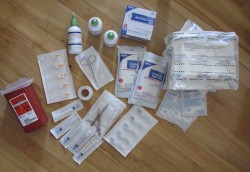
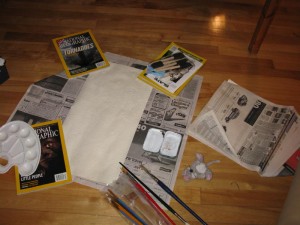
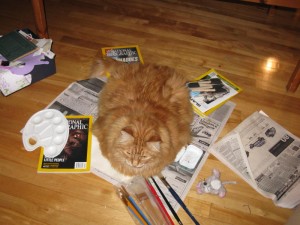
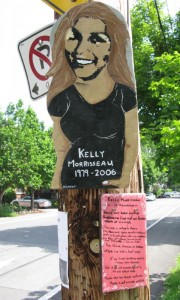
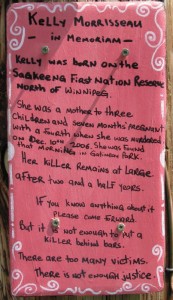
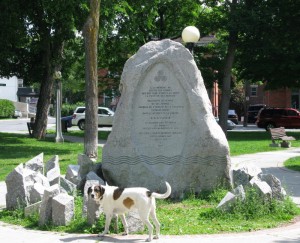


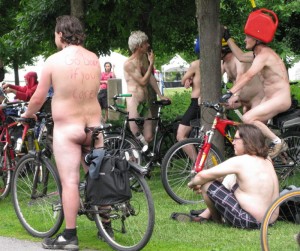
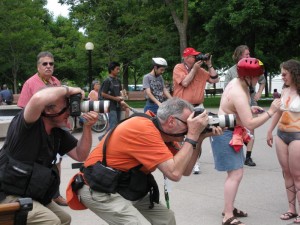
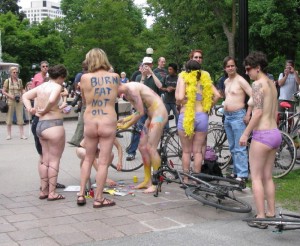
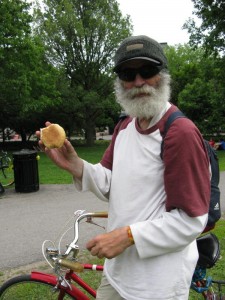




Popular Posts